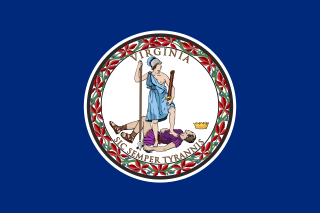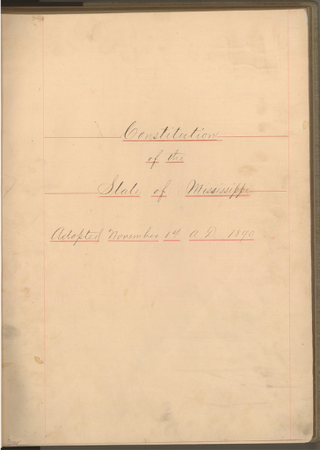Related Research Articles

The governor of the Commonwealth of Virginia serves as the head of government of Virginia for a four-year term. The incumbent, Glenn Youngkin, was sworn in on January 15, 2022.

From the first United States Congress in 1789 through the 116th Congress in 2020, 162 African Americans served in Congress. Meanwhile, the total number of all individuals who have served in Congress over that period is 12,348. Between 1789 and 2020, 152 have served in the House of Representatives, 9 have served in the Senate, and 1 has served in both chambers. Voting members have totaled 156, with 6 serving as delegates. Party membership has been 131 Democrats and 31 Republicans. While 13 members founded the Congressional Black Caucus in 1971 during the 92nd Congress, in the 116th Congress (2019-2020), 56 served, with 54 Democrats and 2 Republicans.

In the American Civil War (1861–65), the border states or the Border South were four, later five, slave states in the Upper South that primarily supported the Union. They were Delaware, Maryland, Kentucky, and Missouri, and after 1863, the new state of West Virginia. To their north they bordered free states of the Union, and all but Delaware bordered slave states of the Confederacy to their south.

The Solid South was the electoral voting bloc for the Democratic Party in the Southern United States between the end of the Reconstruction era in 1877 and the Civil Rights Act of 1964. During this period, the Democratic Party controlled southern state legislatures and most local, state and federal officeholders in the South were Democrats. During the late 19th century and early 20th century, Southern Democrats disenfranchised nearly all blacks in all the former Confederate states. This resulted in a one-party system, in which a candidate's victory in Democratic primary elections was tantamount to election to the office itself. White primaries were another means that the Democrats used to consolidate their political power, excluding blacks from voting.
Southern Democrats are members of the U.S. Democratic Party who reside in the Southern United States.

The Readjuster Party was a bi-racial state-level political party formed in Virginia across party lines in the late 1870s during the turbulent period following the Reconstruction era that sought to reduce outstanding debt owed by the state. Readjusters aspired "to break the power of wealth and established privilege" among the planter elite of whites in the state and to promote public education. The party's program attracted support among both white people and African-Americans.

The Constitution of Mississippi is the primary organizing law for the U.S. state of Mississippi delineating the duties, powers, structures, and functions of the state government. Mississippi's original constitution was adopted at a constitutional convention held at Washington, Mississippi in advance of the western portion of the territory's admission to the Union in 1817. The current state constitution was adopted in 1890 following the reconstruction period. It has been amended and updated 100 times in since its adoption in 1890, with some sections being changed or repealed altogether. The most recent modification to the constitution occurred in November 2020, when Section 140 was amended, and Sections 141-143 were repealed.

The Alabama Legislature is the legislative branch of the government of the U.S. state of Alabama. It is a bicameral body composed of the House of Representatives and Senate. It is one of the few state legislatures in which members of both chambers serve four-year terms and in which all are elected in the same cycle. The most recent election was on November 8, 2022. The new legislature assumes office immediately following the certification of the election results by the Alabama Secretary of State which occurs within a few days following the election.

The First Military District of the U.S. Army was one of five temporary administrative units of the U.S. War Department that existed in the American South. The district was stipulated by the Reconstruction Acts during the Reconstruction period following the American Civil War. It only included Virginia, and was the smallest of the five military districts in terms of size. The district was successively commanded by Brigadier General John Schofield (1867–1868), Colonel George Stoneman (1868–1869) and Brigadier General Edward Canby (1869–1870).

The South Carolina Republican Party (SCGOP) is the state affiliate of the national Republican Party in South Carolina. It is one of two major political parties in the state, along with the South Carolina Democratic Party, and is the dominant party. Incumbent governor Henry McMaster, as well as senators Tim Scott and Lindsey Graham, are members of the Republican party. Graham has served since January 3, 2003, having been elected in 2002 and re-elected in 2008, 2014, and 2020; Tim Scott was appointed in 2013 by then-governor Nikki Haley, who is also a Republican.

Henry Mason Mathews was an American military officer, lawyer, and politician in the U.S. State of West Virginia. Mathews served as 7th Attorney General of West Virginia (1873–1877) and 5th Governor of West Virginia (1877–1881), being the first former Confederate elected to the governorship in the state. Born into a Virginia political family, Mathews attended the University of Virginia and afterward practiced law before the outbreak of the American Civil War. When Virginia seceded from the United States, in 1861, he volunteered for the Confederate States Army and served in the western theater as a major of artillery. Following the war, Mathews was elected to the West Virginia Senate, but was denied the seat due to state restrictions on former Confederates. Mathews participated in the 1872 state constitutional convention that overturned these restrictions, and in that same year was elected attorney general of West Virginia. After one term, he was elected governor of West Virginia.
The Louisiana Democratic Party is the affiliate of the Democratic Party in the state of Louisiana.

The West Virginia Democratic Party is the affiliate of the Democratic Party in the U.S. state of West Virginia.

Disfranchisement after the Reconstruction era in the United States, especially in the Southern United States, was based on a series of laws, new constitutions, and practices in the South that were deliberately used to prevent black citizens from registering to vote and voting. These measures were enacted by the former Confederate states at the turn of the 20th century. Efforts were also made in Maryland, Kentucky, and Oklahoma. Their actions were designed to thwart the objective of the Fifteenth Amendment to the United States Constitution, ratified in 1870, which prohibited states from depriving voters of their voting rights based on race. The laws were frequently written in ways to be ostensibly non-racial on paper, but were implemented in ways that selectively suppressed black voters apart from other voters.

The politics of Virginia have followed major historical events and demographic changes in the commonwealth. In the 21st century, the northern region has become more liberal in attitudes and voting, constituting a reliable voting bloc for Democrats and joining with population centers in the Richmond Metropolitan and Hampton Roads areas to dominate the state. Political orientation varies by region, with the larger cities and suburban areas generally voting Democratic and the rural areas voting Republican. The southern, rural regions have remained Republican. Until 2021 when the GOP swept all statewide offices, Virginia was shifting more Democratic and now is considered a swing state again by most pundits.

Elections in Virginia are authorized under Article I of the Virginia State Constitution, sections 5–6, and Article V which establishes elections for the state-level officers, cabinet, and legislature. Article VII section 4 establishes the election of county-level officers. Elections are regulated under state statute 24.2-102. The Virginia State Board of Elections oversees the execution of elections under state law. In a 2020 study, Virginia was ranked as the 12th easiest state for citizens to vote in.

The 1874–75 United States Senate elections were held on various dates in various states. As these U.S. Senate elections were prior to the ratification of the Seventeenth Amendment in 1913, senators were chosen by state legislatures. Senators were elected over a wide range of time throughout 1874 and 1875, and a seat may have been filled months late or remained vacant due to legislative deadlock. In these elections, terms were up for the senators in Class 1.
The State government of Arkansas is divided into three branches: executive, legislative and judicial. These consist of the state governor's office, a bicameral state legislature known as the Arkansas General Assembly, and a state court system. The Arkansas Constitution delineates the structure and function of the state government. Since 1963, Arkansas has had four seats in the U.S. House of Representatives. Like all other states, it has two seats in the U.S. Senate.

The 1870 Missouri gubernatorial election was held on November 8, 1870, and resulted in a victory for the Liberal Republican nominee, former Senator Benjamin Gratz Brown, over incumbent Republican Governor Joseph W. McClurg.

The Virginia Constitutional Convention of 1868, was an assembly of delegates elected by the voters to establish the fundamental law of Virginia following the American Civil War and the Fourteenth Amendment to the US Constitution. The Convention, which met from December 3, 1867 until April 17, 1868, set the stage for enfranchising freedmen, Virginia's readmission to Congress and an end to Congressional Reconstruction.
References
- Ambler, Charles H. & Festus P. Summers. West Virginia: The Mountain State. Englewood Cliffs, NJ: Prentice-Hall, 1958.
- Rice, Otis K. & Stephen W. Brown. West Virginia: A History. Lexington: University Press of Kentucky, 1993.
- Callahan, James M. Semi- Centennial History of West Virginia. Charleston: Semi-Centennial Commission, 1913.